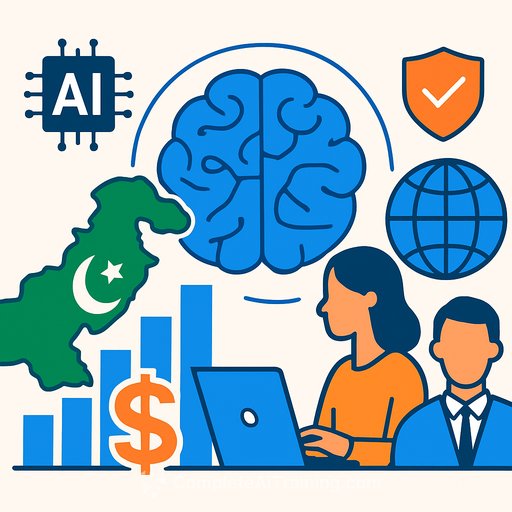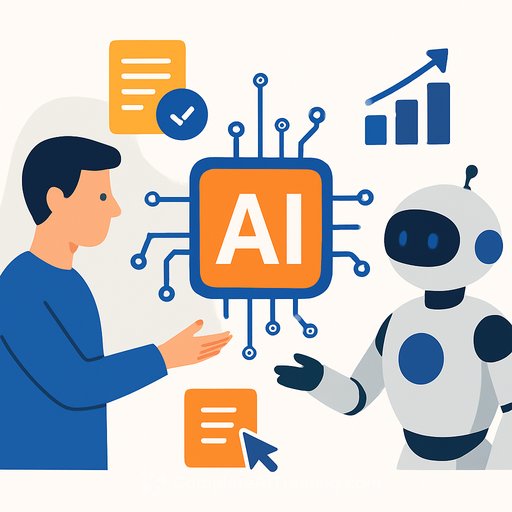Pakistan's National AI Policy: What Government Teams Need to Deliver in the Next Five Years
Pakistan's National AI Policy sets a clear goal: build a $2.7 billion domestic AI market within five years and modernize public services along the way. The framework rests on six pillars-innovation, skills, secure and ethical use, sector transformation, infrastructure, and international collaboration.
If you work in government, this is a build plan. Below is what the policy proposes, what it asks of ministries and agencies, and where to start.
Secure AI Ecosystem
The policy mandates shared AI cybersecurity systems across institutions to protect critical infrastructure. An AI Directorate will act as the ethics and oversight body, including data privacy guardrails and rules for generative AI to reduce misinformation, privacy breaches, and copyright risks.
Transparency is central: a public register of AI systems will let citizens see where and how AI is used. An open-source governance framework and a national data security policy will set standards, identify gaps, and detail remediation.
Immediate actions for ministries
- Appoint an AI Risk Lead and form a cross-functional AI governance group (legal, IT, procurement, data protection).
- Inventory all current and planned AI systems for the public register, including purpose, datasets, and human oversight measures.
- Map sensitive datasets; classify by risk; enforce access controls and logging across agencies.
- Adopt a recognized risk framework and impact assessment template for AI projects. See the NIST AI Risk Management Framework and the OECD AI Principles.
Jobs and Skills
The policy targets training 200,000 people each year in AI tools, with specific modules for marginalized women and specially-abled citizens. It adds 3,000 annual scholarships for AI postgraduate and doctoral programs and an interest-free education financing scheme for 15,000 "high-tech" degrees.
Public servants will get a specialized AI curriculum focused on ethical use and data protection. A national internship program will create 20,000 AI internships annually.
Immediate actions for ministries
- Nominate departmental cohorts for public servant AI training and certify them within 6-9 months.
- Publish internship slots within your agency tied to real AI projects (data cleaning, model evaluation, documentation).
- Prioritize training paths for frontline staff in education, health, agriculture, and energy where AI adoption will start first.
- Explore structured learning tracks for your teams. For role-based options, see AI courses by job.
Innovation and Funding
A National AI Fund (NAIF) under the Ignite National Technology Fund will finance research, innovation, and commercialization. About 30% of Ignite's R&D resources will be directed to AI.
Centres of Excellence (CoEs) across cities will support research, training, and startup incubation. An innovation fund will back projects in healthcare, education, and agriculture, while a venture fund will help scale early-stage AI startups. New data standards and quality assurance frameworks will guide trustworthy model development.
Immediate actions for ministries
- Draft problem statements tied to national priorities (e.g., maternal health triage, crop disease alerts, grid load forecasting) for NAIF-backed challenges.
- Define data quality and audit requirements in all R&D grants and public procurements.
- Co-develop pilots with CoEs; set milestones that prove accuracy, safety, cost savings, and service improvement.
Transformation and Evolution
The government will create roadmaps for AI in education, healthcare, agriculture, and energy management. A new Ranking Management System will help public bodies and businesses pick the right AI tools.
Industrial adoption remains voluntary, but tax breaks, subsidies, and training support are on the table for participants. The policy also includes AI support for farmers to cut crop losses.
Immediate actions for ministries
- Pick 2-3 high-value use cases per sector (e.g., teacher lesson planning assistants, hospital triage support, precision irrigation advice, demand forecasting for energy).
- Set procurement templates with evaluation criteria based on accuracy, security, privacy, explainability, and local language support.
- Define safeguards: human-in-the-loop reviews, red-teaming for misuse, and clear citizen complaint mechanisms.
AI Infrastructure
A nationwide AI network will deliver computing resources for model training and large-scale experiments, with access for at least 100 universities and research institutions. National and provincial data repositories will be curated and maintained, while public-sector data centers will be upgraded for better performance and access.
Cloud-based services and shared AI resources will lower barriers for agencies, researchers, and startups. The goal is to make compute and data easily accessible while maintaining security and compliance.
Immediate actions for ministries
- Estimate compute needs for pilots; pool demand across agencies to reduce cost through shared services.
- Publish dataset documentation (provenance, quality checks, update frequency) and remove personal identifiers wherever feasible.
- Adopt cloud guardrails: encryption, key management, identity and access management, and continuous monitoring.
International Collaboration
The policy calls for bilateral agreements with leading AI nations, joint research centers, alignment with international regulations and standards, and active participation in global AI forums. Foreign direct investment is a major lever to fuel local growth.
Talent exchange programs will send students and professionals abroad for high-quality training, with pathways to bring skills back into domestic projects.
Immediate actions for ministries
- Identify 3-5 international partners per sector and propose joint projects with measurable outputs (datasets, benchmarks, toolkits).
- Create return-to-service agreements for funded scholars to ensure skills transfer into priority programs.
- Standardize legal templates for data sharing and cross-border research to speed up collaboration.
Policy to Operations: Governance, KPIs, and Timelines
To move from policy to daily work, set clear governance and measurement from the start. Keep it simple, public, and auditable.
- Leadership and oversight: AI Directorate coordinates; each ministry appoints an AI Lead and publishes a registry of AI systems under its control.
- Data and privacy: agency-level data maps; DPIAs for high-risk AI; regular audits shared with the Directorate.
- Model quality: benchmark targets (accuracy, fairness, uptime), human oversight protocols, incident response within defined SLAs.
- Access and equity: annual training numbers, gender inclusion metrics, accessibility standards in AI tools.
- Economic outcomes: jobs created, internships completed, startups funded, export revenue, and productivity gains in pilot programs.
- Timelines: 90 days for AI inventories and risk leads; 6 months for first pilot launches; 12 months for public register coverage across major agencies; annual reviews with public scorecards.
What Success Looks Like
Citizens can see where AI is used, request redress when needed, and benefit from faster, better services. Ministries deliver pilots that work in the field, document results, and scale what proves value.
Universities, CoEs, and startups tap into shared compute and data, while trained civil servants manage risk and outcomes. With the right execution, the policy becomes a practical engine for jobs, productivity, and trust in digital public services.
Your membership also unlocks:






